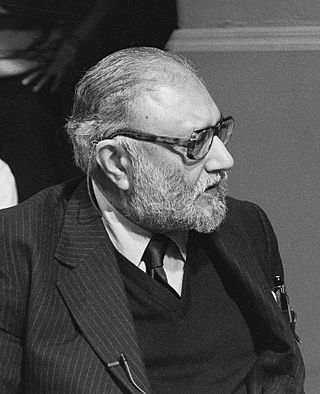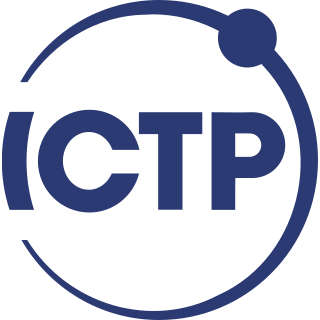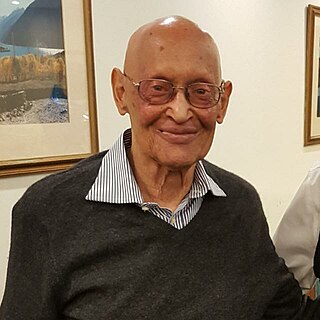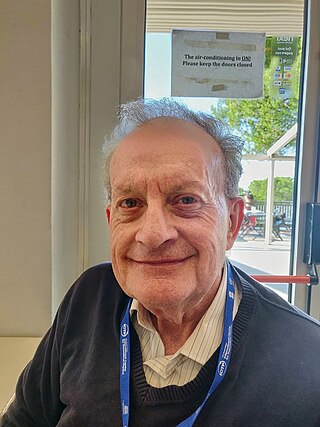Related Research Articles

Mohammad Abdus Salam was a Pakistani theoretical physicist. He shared the 1979 Nobel Prize in Physics with Sheldon Glashow and Steven Weinberg for his contribution to the electroweak unification theory. He was the first Pakistani and the first Muslim from an Islamic country to receive a Nobel Prize in science and the second from an Islamic country to receive any Nobel Prize, after Anwar Sadat of Egypt.
Sir Robert Brian Heap is a British biological scientist.

Mambillikalathil Govind Kumar Menon also known as M. G. K. Menon, was a physicist and policy maker from India. He had a prominent role in the development of science and technology in India over four decades. One of his most important contributions was nurturing the Tata Institute of Fundamental Research, Mumbai, which his mentor Homi J. Bhabha founded in 1945.

Fernando Quevedo Rodríguez is a Guatemalan physicist and obtained his early education in Guatemala. He was the director of the Abdus Salam International Centre for Theoretical Physics (ICTP) between October 2009 and November 2019.

The Abdus Salam International Centre for Theoretical Physics (ICTP) is an international research institute for physical and mathematical sciences that operates under a tripartite agreement between the Italian Government, United Nations Educational, Scientific and Cultural Organization (UNESCO), and International Atomic Energy Agency (IAEA). It is located near the Miramare Park, about 10 kilometres from the city of Trieste, Italy. The centre was founded in 1964 by Pakistani Nobel Laureate Abdus Salam.
Sir Robert Lewis Fullarton Boyd was a pioneer of British space science and founding director of the Mullard Space Science Laboratory.
Sir Michael Pepper is a British physicist notable for his work in semiconductor nanostructures.
Michael John Seaton was an influential British mathematician, atomic physicist, and astronomer.
Andrew Richard Lang FRS CBE was a British scientist and crystallographer.
The International Nathiagali Summer College on Physics and Contemporary Needs (INSC), was founded by Nobel laureate in Physics Dr. Abdus Salam (then-Science Advisor to the Prime minister) to promote physics and scientific research activities in Pakistan. Having suggested by Professor Abdus Salam to the Government of Pakistan, it was established by the Pakistan Atomic Energy Commission's chairman Mr. Munir Ahmad Khan.

Asghar QadirHI, SI, FPAS, is a Pakistani mathematician and a prominent cosmologist, specialised in mathematical physics and physical cosmology. Nowadays, he is widely considered one of the top mathematicians in Pakistan. Asghar has played a prominent role in promoting Relativity in Pakistan. To this day, Qadir has made important and significant contributions to the fields of differential equations, theoretical cosmology and mathematical physics. He is noted for his work in mathematics and mathematical physics, in particular his contributions to general relativity and cosmology.
Fayyazuddin, also spelled as Fayyaz Uddin, is a Pakistani theoretical physicist, emeritus professor, specialising in theoretical physics and mathematical physics at Quaid-e-Azam University campus National Centre for Physics, Islamabad. He is a senior scientist at the National Center for Physics. Fayyaz is doing research in the fields of quantum mechanics, particle physics, and meson physics. He has published numerous physics papers accompanied by Riazuddin and has co-authored Quantum Mechanics by Fayyazuddin and Riazuddin published in 1990.
The Australian Institute of Physics was established in 1963, when it replaced the Australian Branch of the British Institute of Physics based in London. The purpose of the institute is to promote the role of physics in research, education, industry and the community. The AIP publishes Australian Physics since 1963. Every two years, the Institute organises a national congress, the latest being held in December 2022 in Adelaide.
The Walter Boas Medal is awarded by the Australian Institute of Physics for research in Physics in Australia. It is named in memory of is named in memory of Walter Boas (1904-1982) — an eminent scientist and metallurgist who worked on the physics of metals.
Peter Hannaford is an Australian academic and university professor. He is the Director of the Centre for Atom Optics and Ultrafast Spectroscopy at Swinburne University of Technology in Melbourne, and winner of the Walter Boas Medal in 1985.

Professor Bruce Harold John McKellar is an Australian theoretical particle physicist who is Honorary Professorial Fellow at the Centre of Excellence for Particle Physics at the Terascale (CoEPP) in the School of Physics at The University of Melbourne. The International Union of Pure and Applied Physics (IUPAP) elected him as its President-Designate in 2012. In November 2014 McKellar became President of IUPAP, the first-ever Australian to take on this role.

Gerard James Milburn is an Australian theoretical quantum physicist notable for his work on quantum feedback control, quantum measurements, quantum information, open quantum systems, and Linear optical quantum computing.
Robert Graham Clark is an Australian physicist. He was appointed Professor and Chair of Energy Strategy and Policy at University of New South Wales (UNSW) in 2012. Prior to this he was Chief Defence Scientist from 2008 to 2011 and Professor of Experimental Physics at University of New South Wales, where he established the National Magnet Laboratory and Semiconductor Nanofabrication Facility.
Daniel Afedzi Akyeampong was a Ghanaian academic. He was the first Ghanaian to attain full professorship status in mathematics at the University of Ghana, Legon. In 1966, Daniel Akyeampong and Francis Allotey became the first Ghanaians to obtain a doctorate in mathematical sciences. He was the Pro-Vice Chancellor of the University of Ghana from 1983 to 1985.
References
- 1 2 "Australian Institute of Physics, Tasmanian Branch". Archived from the original on 17 March 2012. Retrieved 13 May 2012.
- 1 2 Rosanne Walker. "Delbourgo, Robert (1940 – )". Encyclopedia of Australian Science. Retrieved 13 May 2012.